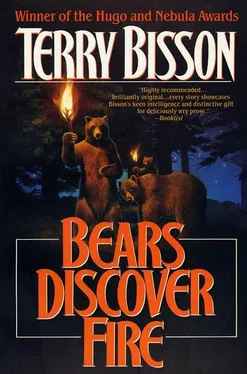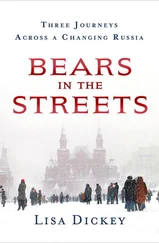“George is over a month old,” I said. “If we remove his wings, won’t he remember them? Even a normal, healthy boy sometimes longs for strange powers.”
“Never,” said the minister. “Does the child remember the womb or the kingdom of Heaven? Better yet: tell him about them. Save the clippings and photographs from his birth and show them to him when he is older. Let him have the pleasure and amusement of a famous birth, but not the bitterness of an estranged life.”
All this made sense. I could make George’s birth only a curious incident in a happy, normal life. I had only one more hesitation—the operation itself. Would it be difficult or dangerous?
“Nothing to it,” said the doctor. “Nothing to it. The wings can be removed as simply as any other growth. We must only wait another month until the child is old enough to take anesthesia.”
“It may take me longer than that to convince Katie,” I said.
“We can’t wait too long. The wings must be removed as soon as possible, before the cartilage and muscle begin to harden. As it is now, the boy will be barely scarred. He will be left with only two small stumps, like handles, for a remembrance.”
“Okay!” I thought. “Fine!” All that was left now was to persuade Katie; I must be firm. I went home decided, full of resolution, but it was soon gone. Katie was quiet and surly; she seemed to know that I was up to something. And I couldn’t take my eyes off George’s wings. They lit up the whole room, like a snowbank at night.
The next morning I went back to see the minister again. “It all boils down to this,” I said. “Why did God give George wings only to have them cut off?”
The minister told me that the ways of God were strange. “Why does He give man life,” he said, “only to take it away again? Why did He create the sky and not allow the fish to see it?” He continued in this vein for several minutes, and then concluded: “You know in your heart that the doctor and I are right—the child’s wings must be removed.”
“Maybe he’s right,” I thought. “Maybe they’re both right.” I was dizzy from thinking. It was time to tell Katie; I left the minister and started for home, determined to go ahead, to do something. Katie and I would have to sit down and talk this thing out.
I tried to get my arguments straight. It was just a simple choice: was George to have a normal, happy life, or was he to be a strange, lonely boy with wings? I saw George as a real boy, with a crowd of others, playing; there he was with his wife and his own children; then a boy again running unencumbered across a short grass field. But there were two Georges: the other was thin, delicate, dark in color. His slight body was all but hidden by huge wings; his fingers were so thin that I could see the blood run through them. His great, dark eyes were marked with the light from his shining wings… Suddenly, I stopped and walked back to the doctor’s office. This was no good; my thoughts were clouded with vision.
“Doctor,” I said, “what will happen to the wings after they are removed? Will you take them off separately, or together? Will they stay bright and clean, or will they shrivel up and die?”
“Why,” said the doctor, “we can do whatever you like with them. They will come off separately, and can easily be preserved. I had thought that you might want to give them to a museum or something. Or perhaps you might want to keep them; George could hang them on the wall of his room as a sort of trophy.”
Well, I had beat around the bush too long. I went home. “Katie,” I said, “the doctor says we should cut off George’s wings—have them removed.” She didn’t say anything. “The minister says so, too, and so do I.” I told her about how he would be an outcast, an emotional cripple. “He won’t always be a baby,” I said. “Look at the future.”
She was holding him and watching me curiously as I spoke. I was watching him, older, still running in the field of short grass. But there was the other, the thin boy with dark eyes and great white wings. “Don’t you see, Katie, he is alone!” It was hard for me to think; he was looking back at me, out of his dream. “He is a cripple. He can’t run, can’t dance, can’t even sit down!” He was on a high hill, I could see that now, with the sea behind him. Katie looked toward the ocean, then back at me. As she began to speak, George began to turn into the wind, his wings trembling as he lifted them over his head…
“Oh no,” said Katie. “He’s not a cripple—he can fly!” We watched him fall forward and then up; as his feet lifted off the thick grass, his wings, held out, began to stir. Katie laughed: “Why should he want to ride a bus? Why should he walk when he can ride and float on the air?” Katie and I watched him all the way out of sight. Another watched him too: the boy running in the field suddenly stopped and looked up. The last light of the sun caught a flash of white, way up, and then the boy on the ground was lost in the great shadow of wings that covered half the hill.
The wind was suddenly quiet; the low sound of the water came in. Katie and I looked up as the gulls’ wings stirred and they fell back toward the sea. Then it was dark; the wind came up again and George started to cry. Katie began to rock him and smiled at me across the room.
When spring came, we went back to the house on the hill. We stayed on through the next winter, and the next.
George learned to walk before I tried to teach him to fly; then, during the third summer, I would take him out on the side of the hill and toss him into the air. At first he would fall with a wild flutter and thump, laughing. By the time cold weather came, he could rise off the ground by himself and stay up for a few seconds. By that time, he had a baby sister. Her wings were red, like fire.
“NEXT!”
“We want to get a marriage license, please.”
“Name?”
“Johnson, Akisha.”
“Age?”
“Eighteen.”
“Groom’s name?”
“Jones, Yusef.”
“Yusef? You with him? Honey, you kids are in the wrong line.”
“We are?”
“Try that line over there, on the other side of the Pepsi machine. And good luck. You’re gonna need it, child. Next!”
“NEXT!”
“We want to apply for a marriage license.”
“For who, might I ask?”
“For us. For me and him.”
“I beg your pardon?”
“She told us to get in this line. I guess because—”
“I can’t give you a marriage license. He’s black.”
“I know, but I heard that if we get a special permit or something—”
“What you’re talking about is a same-race certificate. But I can’t give you one, and I wouldn’t if I could. The very idea of blacks marrying each other , when—”
“So why’d she tell us to get in this line?”
“This line is for same-race certificate applications .”
“So what do we have to do to get one of those?”
“Under the law, just ask for it. Even though there’s something disgusting about—”
“So look, lady, I’m asking.”
“Here. Fill this out and return it to window A21.”
“Does that mean we have to start in line all over again?”
“What do you think? Next!”
“NEXT!”
“Hello, I’m not even sure we’re in the right line. We want to get one of those special certificates. To get married.”
“A same-race certificate. You’re in the right line. But under the Equal Access Provisions of the Melanin Conservation Act, we can’t just hand those out. You have to have an Ozone Waiver to even apply for one.”
“I already have the application filled out. See? That white girl over there told me about it.”
Читать дальше












